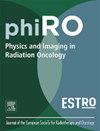Development and international multicentre pilot testing of a postal dosimetry audit methodology for high dose rate brachytherapy
IF 3.4
Q2 ONCOLOGY
引用次数: 0
Abstract
Background and Purpose
Dosimetry audits are essential for reducing errors in brachytherapy. A postal dosimetry audit methodology was developed and tested in an international multicentre pilot, to assess the accuracy of the Reference Air Kerma Rate of 192Ir and 60Co brachytherapy sources.
Materials and Methods
A compact phantom made of polymethyl methacrylate was developed to accommodate two catheters, a radiophotoluminescence dosimeter (RPLD) for dose measurements and a Gafchromic (RTQA2) film strip for source position verification. Deviations of the audit setup from TG-43 conditions were quantified experimentally and compared to previous Monte Carlo (MC) simulations. A measurement uncertainty budget was estimated for the RPLD analysis. The methodology was tested in an international pilot study consisting of 59 dosimeter sets among 48 centres from 11 countries.
Results
The experimental correction factors showed good agreement with previous MC simulations, and the total correction factor accounting for non-water equivalence, lack of scatter and beam quality was found to be 1.029 ± 0.009 for 192Ir and 1.059 ± 0.007 for 60Co sources, to be employed in audit measurement. The total uncertainty budget was estimated to be 2.24 % (k = 1). In the multicentre study, the ratio between measured and reported user dose ranged from 0.968 to 1.049, with all irradiated dosimeter sets within ± 5 %, and 54 out of 59 within ± 3 %.
Conclusions
The methodology was tested in an international multicentre pilot study and has shown good performance validating the uncertainty budget.
高剂量率近距离放射治疗邮寄剂量测量审计方法的开发和国际多中心试点测试
背景和目的剂量测定审核对于减少近距离放射治疗中的误差至关重要。我们开发了一种邮政剂量测定审核方法,并在一个国际多中心试点中进行了测试,以评估 192Ir 和 60Co 近距离放射源的参考空气柯玛率的准确性。材料和方法 我们开发了一个由聚甲基丙烯酸甲酯制成的紧凑型模型,可容纳两个导管、一个用于剂量测量的放射光致发光剂量计 (RPLD) 和一个用于放射源位置验证的 Gafchromic (RTQA2) 胶片条。对审计设置与 TG-43 条件的偏差进行了实验量化,并与之前的蒙特卡罗(MC)模拟进行了比较。为 RPLD 分析估算了测量不确定性预算。结果 实验校正因子与之前的蒙特卡洛模拟结果显示出良好的一致性,并发现 192Ir 和 60Co 辐射源的总校正因子分别为 1.029 ± 0.009 和 1.059 ± 0.007(考虑到非水等效、缺乏散射和光束质量),可用于审核测量。总不确定性预算估计为 2.24 %(k = 1)。在多中心研究中,用户剂量的测量值与报告值之间的比率介于 0.968 至 1.049 之间,所有辐照剂量计的测量值均在± 5 %以内,59 个剂量计中有 54 个剂量计的测量值在± 3 %以内。
本文章由计算机程序翻译,如有差异,请以英文原文为准。
求助全文
约1分钟内获得全文
求助全文
来源期刊

Physics and Imaging in Radiation Oncology
Physics and Astronomy-Radiation
CiteScore
5.30
自引率
18.90%
发文量
93
审稿时长
6 weeks
 求助内容:
求助内容: 应助结果提醒方式:
应助结果提醒方式:


